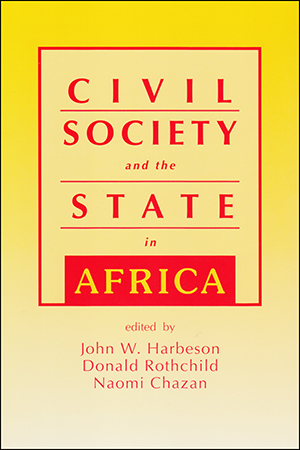John W. Harbeson, Donald Rothchild, and Naomi Chazan, editors
This seminal book examines the potential value of the concept of civil society for enhancing the current understanding of state-society relations in Africa. The authors review the meanings of civil society in political philosophy, as well as alternative theoretical approaches to employing the concept in African settings. Considering both the patterns of emerging civil society in Africa and issues relating to its further development, they give particular emphasis to the cases of Cote d'Ivoire, Ghana, Kenya, Nigeria, Sudan, Tanzania, Uganda, and Zaire.
John W. Harbeson is professor of political science in the Graduate Center and the City College of the City University of New York. His most recent books are The Ethiopian Transformation: The Quest for the Post-Imperial State and (as coeditor) Africa in World Politics. The late Donald Rothchild was professor of political science at the University of California at Davis. Naomi Chazan is professor emeritus of political science at the Hebrew University of Jerusalem. She is coauthor of Ghana: Coping with Uncertainty and Politics and Society in Contemporary Africa.
"A well-crafted and well-focused step in making more sense of the crisis of the African state, and of what might come next. It provides the social scientist with a broad overview of 'civil society' as a concept, of a number of ways the concept may be used, and of the philosophical implications of these uses. It also provides several strong case studies of contemporary state society relations in Africa."—The Journal of Politics
"This well-edited edition will be of interest to all comparativist scholars of Africa and the Third World more generally"—Southeastern Political Review
"The authors explore the theoretical properties of civil society in both its classic and contemporary usage, as well as its many manifestations, in present-day Africa.... A volume that provides no definitive argument about the shape or significance of civil society but that fully elucidates this complex phenomenon."—American Political Science Review






